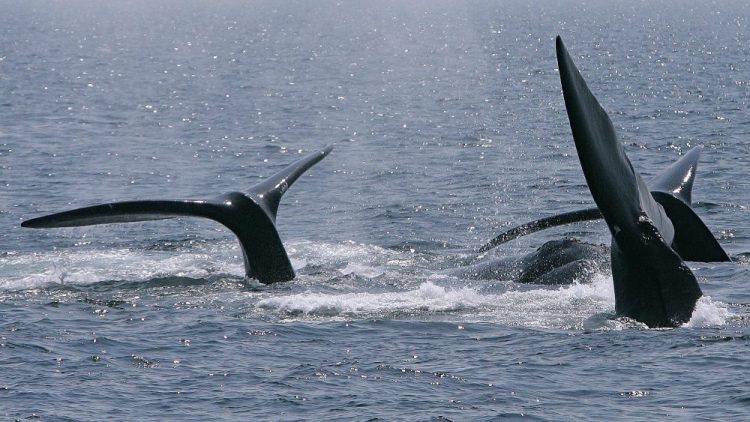A judge’s ruling that the federal government didn’t take adequate steps to protect endangered whales will probably result in another monthslong court battle, parties to the lawsuit said.
Environmental groups sued the U.S. government with a claim that regulators’ failure to protect the North Atlantic right whale from harm was a violation of the Endangered Species Act, and U.S. District Judge James Boasberg ruled April 9 that they were right. The right whales number only about 400 and are in the midst of a worrisome decline in population.
The government, environmentalists and industry members who are involved in the lawsuit must still return to court to determine a remedy. Boasberg ruled that the risk posed to the whales by the lobster fishery was too great to be sustainable, and that a remedy could ultimately result in new restrictions on lobster fishing.
The whales are vulnerable to lethal entanglement in lobster fishing gear.
Members of the industry, including the Maine Lobstermen’s Association, have vowed to fight to protect the fishery. The two sides will have to exchange court filings about what the remedy could look like, and the process is likely to take months, said Jake O’Neill, a spokesman for Conservation Law Foundation, one of the environmental groups involved in the lawsuit.
That the way the process will play out is uncertain is one of few things the environmentalists and fishermen agree on, though both have vowed to save the whales.
“Too soon to know,” said Patrice McCarron, executive director of the Maine Lobstermen’s Association.
A spokeswoman for the National Ocean and Atmospheric Administration’s National Marine Fisheries Service, the federal agency that handles ocean issues, declined to comment because the lawsuit is still in court.
The environmental groups behind the lawsuit have characterized Boasberg’s ruling as a victory for the whales, which were hunted to near extinction during the commercial whaling era.
Kristen Monsell, oceans legal director at the Center for Biological Diversity, said the decision “should send a clear signal that federal officials must take immediate action to protect these amazing animals from suffering more deadly, painful entanglements before it’s too late.”
But lobster fishing groups have said that they’re already working to reduce risk to the rare whales and that they’re committed to doing more. The groups represent an industry that harvests one of the most lucrative marine resources in the United States. Lobsters were worth well over half a billion dollars at the docks in 2018.
The Maine Lobstermen’s Association is among fishing groups that have intervened in the lawsuit in defense of the federal government. McCarron said in a recent statement that it will “bring the voice of Maine’s lobstermen to the court” and is “ready to continue this important work with the court.”
Maine marine resources Commissioner Patrick Keliher also issued a statement expressing “deep disappointment about the courts decision” and said the state is still reviewing it to determine what it means for the lobster fishery and what steps the state can take.
Copy the Story LinkSend questions/comments to the editors.



Success. Please wait for the page to reload. If the page does not reload within 5 seconds, please refresh the page.
Enter your email and password to access comments.
Hi, to comment on stories you must . This profile is in addition to your subscription and website login.
Already have a commenting profile? .
Invalid username/password.
Please check your email to confirm and complete your registration.
Only subscribers are eligible to post comments. Please subscribe or login first for digital access. Here’s why.
Use the form below to reset your password. When you've submitted your account email, we will send an email with a reset code.